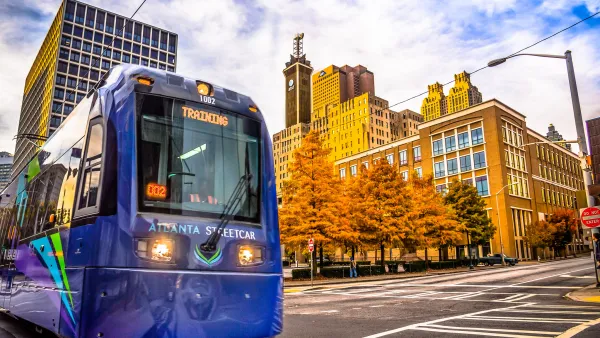Voters in the Atlanta metro area overwhelmingly rejected a 1% sales tax increase to fund $7.2 billion in transportation improvements. The result is being framed as a victory for anti-government Tea Party allies and a loss for the region's economy.
The decisive failure of the referendum (63% opposed), which would have funded "a $6.14 billion list of 157 regional
projects - relieving congestion at key Interstate highway chokepoints and
opening 29 miles of new rail track to passengers, among others - as well as
$1 billion worth of smaller local projects," was "fueled by citizens' distrust of
government and the metro area's splintered transportation desires," writes Ariel Hart.
"'It's heartbreaking,' said Ashley Robbins, president of Citizens for
Progressive Transit, one of dozens of organizations that worked for the
referendum. She predicted a loss of valuable young workers to the region's
economy. 'If Atlanta's not the region that we want, the young energetic
people that drove these campaigns are going to leave.'"
Of course, the majority of voters applauded the result. Writing in the Atlanta Journal-Constitution, Craig Schneider saw the defeat of the referendum as "a big win for the Georgia tea party, whose
leaders didn't shy away Tuesday night from claiming giant-slayer status."
According to Bob Grafstein, assistant dean of the University of Georgia's school of public and international affairs, the results, "make [the tea party] look like people protecting the average citizen from the rapacious government."
Rounding out AJC's coverage, Jim Galloway charts the course forward for efforts to improve "the mess that is Georgia's system of planning and paying for moving goods and people." According to Galloway, the ball will now bounce to Gov. Nathan Deal's court.
"What voters dismissed was a bottom-up list of $8 billion in road and rail projects created by local elected leaders. The Plan B that staggered out of the governor's office will be its polar
opposite: Dramatically smaller, paid for with shrinking funds, and
highly centralized. Projects will be hand-picked by a governor who
intends to squeeze every penny available."
FULL STORY: Voters reject transportation tax

National Parks Layoffs Will Cause Communities to Lose Billions
Thousands of essential park workers were laid off this week, just before the busy spring break season.

Retro-silient?: America’s First “Eco-burb,” The Woodlands Turns 50
A master-planned community north of Houston offers lessons on green infrastructure and resilient design, but falls short of its founder’s lofty affordability and walkability goals.

Delivering for America Plan Will Downgrade Mail Service in at Least 49.5 Percent of Zip Codes
Republican and Democrat lawmakers criticize the plan for its disproportionate negative impact on rural communities.

Test News Post 1
This is a summary

Test News Headline 46
Test for the image on the front page.

Balancing Bombs and Butterflies: How the National Guard Protects a Rare Species
The National Guard at Fort Indiantown Gap uses GIS technology and land management strategies to balance military training with conservation efforts, ensuring the survival of the rare eastern regal fritillary butterfly.
Urban Design for Planners 1: Software Tools
This six-course series explores essential urban design concepts using open source software and equips planners with the tools they need to participate fully in the urban design process.
Planning for Universal Design
Learn the tools for implementing Universal Design in planning regulations.
EMC Planning Group, Inc.
Planetizen
Planetizen
Mpact (formerly Rail~Volution)
Great Falls Development Authority, Inc.
HUDs Office of Policy Development and Research
NYU Wagner Graduate School of Public Service



























